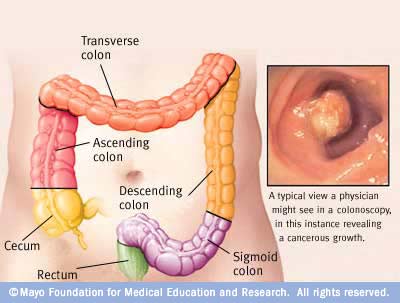
Colon Cancer ? Symptoms & Treatments
Colon cancer is cancer that starts in the large intestine or the rectum. The colon makes up the longest part of the large intestine, which is a tube-like organ connected to the small intestine at one end and the anus at the other. The colon removes water and some nutrients and electrolytes from partially digested food.
Colon cancer does not always present symptoms in the early stages. Colon cancer symptoms usually do not appear until the disease has progressed into an advanced stage.
Most colon cancers originate from small, noncancerous tumors called adenomatous polyps that form on the inner walls of the large intestine. Some of these polyps may grow into malignant colon cancers over time if they are not removed during colonoscopy. Colon cancer cells will invade and damage healthy tissue that is near the tumor causing many complications.
There is no single cause for colon cancer. Nearly all colon cancers begin as noncancerous polyps, which slowly develop into cancer.
You have a higher risk for colon cancer if you have :
1. Cancer elsewhere in the body2. Colorectal polyps3. Crohn’s disease4. Family history of colon cancer5. Personal history of breast cancer6. Ulcerative colitis7. Smokers and heavy drinkers have an increased risk of developing colon cancer
Certain genetic syndromes also increase the risk of developing colon cancer.
Colon cancer can have many symptoms. however, in the early stages, people with colon cancer often have no symptoms at all. This is why regular screening beginning at 50 is an important investment in your healthy future.
1. a change in bowel habits2. Diarrhea, constipation or feeling that the bowel does not empty completely3. Blood, either bright red or very dark in the stool4. Stools that are narrower than usual5. General abdominal discomfort such as frequent gas pains, bloating, fullness or cramps6. Weight loss with no known reason7. Constant tiredness8. Vomiting
Unfortunately, colon cancers can be well advanced before they are detected. The most effective prevention of colon cancer is early detection and removal of precancerous colon polyps before they turn cancerous. Even in cases where cancer has already developed, early detection still significantly improves the chances of a cure by surgically removing the cancer before the disease spreads to other organs.
Other things you can do to lower your risk include the following:
1. Quit smoking. Smoking cigarettes has been clearly linked with higher risk of colon cancer
2. take an aspirin or baby aspirin every day.
3. take a safe dose of folic acid cevery day.
4. Engage in physical activity every day.
5. Eat a variety of fruits and vegetables every day.
Different types of treatment are available for patients with colon cancer. The primary treatment of colon cancer is to surgically remove part or all of your colon. Treatment for colon cancer may include surgery, radiation therapy or chemotherapy.
Surgery is the most common treatment for all stages of colon cancer. Depending on the stage and size of your tumor, your doctor will remove your cancer with Local excision, Resection, Radiofrequency ablation and Cryosurgery
Chemotherapy is a cancer treatment that uses drugs to stop the growth of cancer cells, either by killing the cells or by stopping them from dividing. When chemotherapy is taken by mouth or injected into a vein or muscle, the drugs enter the bloodstream and can reach cancer cells throughout the body
Radiation therapy is a cancer treatment that uses high-energy x-rays or other types of radiation to kill cancer cells or keep them from growing. There are two types of radiation therapy. External radiation therapy uses a machine outside the body to send radiation toward the cancer. Internal radiation therapy uses a radioactive substance sealed in needles, seeds, wires, or catheters that are placed directly into or near the cancer.
Some of the tests that were done to diagnose the cancer or to find out the stage of the cancer may be repeated. Some tests will be repeated in order to see how well the treatment is working. Decisions about whether to continue, change, or stop treatment may be based on the results of these tests.
treatments-for-cancer.blogspot.com/2009_11_08_archive.html
Related Articles
- After breast cancer, Christina Applegate gets a new perspective on …
- Strength of Recommendations for Breast Cancer Screening
- Dayton's German shepherd, Dakota, dies of cancer | Rick …